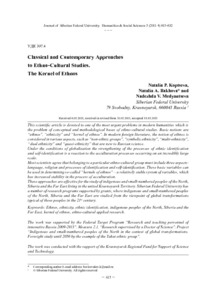Классические и современные подходы к этнокультурным исследованиям. Ядро этноса
Скачать файл:
URI (для ссылок/цитирований):
https://elib.sfu-kras.ru/handle/2311/2360Автор:
Копцева, Н.П.
Koptseva, Natalia P.
Бахова, Н.А.
Bakhova, Natalia A.
Медянцева, Н.В.
Medyantseva, Nadezhda V.
Дата:
2011-05Аннотация:
This scientific article is devoted to one of the most urgent problems in modern humanities which is
the problem of conceptual and methodological bases of ethno-cultural studies. Basic notions are
ethnos, ethnicity and kernel of ethnos. In modern foreign literature, the notion of ethnos is
considered in various aspects, such as non-ethnic groups, symbolic ethnicity, multi-ethnicity,
dual ethnicity and quasi-ethnicity that are new to Russian science.
Under the conditions of globalization the strengthening of the processes of ethnic identification
and self-identification is a reaction to the acculturation processes occurring on an incredibly large
scale.
Most scientists agree that belonging to a particular ethno-cultural group must include three aspects:
language, religion and processes of identification and self-identification. These basic variables can
be used in determining so-called kernels of ethnos - a relatively stable system of variables, which
has increased stability in the process of acculturation.
These approaches are effective for the study of indigenous and small-numbered peoples of the North,
Siberia and the Far East living in the united Krasnoyarsk Territory. Siberian Federal University has
a number of research programs supported by grants, where indigenous and small-numbered peoples
of the North, Siberia and the Far East are studied from the viewpoint of global transformations
typical of these peoples in the 21st century. Научная статья посвящена одной из самых актуальных проблем современной гуманитарной
науки - проблеме концептуальных и методологических оснований этнокультурных исследований.
Базовыми понятиями выступают «этнос», «этничность», «ядро этноса». В современной
зарубежной литературе понятие этноса рассматривается в различных аспектах, в том
числе в таких новых для отечественной науки, как «безэтничные группы», «символическая
этничность», «мультиэтничность», «сдвоенная этничность», «квазиэтничность».
В условиях глобализации активизация процессов этнической идентификации и
самоиндентификации является реакцией на процессы аккультурации, протекающие в
невероятных до недавнего времени масштабах.
Ученые большинства направлений согласны в том, что принадлежность к той или иной
этнокультурной группе обязательно включает три аспекта: язык, религию и процессы
идентификации и самоидентификации. Эти базовые переменные можно использовать при
определении т.н. «ядра этноса» - относительно устойчивой системы переменных величин,
которая обладает повышенной устойчивостью в процессах аккультурации.
Данные подходы являются эффективными для исследования коренных и малочисленных народов
Севера, Сибири и Дальнего Востока, компактно проживающих в объединенном Красноярском
крае. В Сибирском федеральном университете с помощью грантовых поддержек существует
ряд исследовательских программ, где коренные и малочисленные народы Севера, Сибири и
Дальнего Востока изучаются с точки зрения глобальных трансформаций, характерных для
этих народов в 21 веке.
Коллекции:
Метаданные:
Показать полную информациюСвязанные материалы
Показаны похожие ресурсы по названию, автору или тематике.
-
Future Teachers’ Training in Identification and Development of IT Giftedness at Schools of the Republic of Tyva
Kuular, Dolaana O.; Ragulina, Marina I.; Lapchik, Mikhail P.; Куулар, Д. О.; Рагулина, М. И.; Лапчик, М. П. (Сибирский федеральный университет. Siberian Federal University, 2019-09)The article studies the issue of future bachelors’ of education professional training improvement (education profile — “computer science”) in order to identify and develop children’s IT‑giftedness in cultural and educational ... -
Этнообразующие механизмы и формы самосознания коренных народов в условиях внешнего цивилизационного давления (на примере якутского этноса)
Копцева, Н.П.; Koptseva, Natalya P.; Пименова, Н.Н.; Pimenova, Natalia N.; Лузан, В.С.; Luzan, Vladimir S.; Семенова, А.А.; Semenova, Alexandra A.; Сертакова, Е.А.; Sertakova, Ekaterina A.; Бахова, Н.А.; Bakhova, Natalia A. (Сибирский федеральный университет. Siberian Federal University., 2012-07)In the present situation of active development of resource-rich territories of Siberia and the North, the problem of self-preservation of their indigenous ethnos has become more urgent. The preservation of the indigenous ... -
Ethnic Pedagogical Knowledge (Expansion of Content on the Materials of the Republic of Tuva)
Oorzhak, Svetlana Ya.; Oorzhak, Kherel-ool D.-N.; Ооржак, С.Я.; Ооржак (Сибирский федеральный университет. Siberian Federal University, 2018)Ethnic pedagogical knowledge in its content covers a set of knowledge in the field of ethnic pedagogy beginning with its subject – folk pedagogy and its origins, as well as knowledge in the field of many disciplines. The ... -
Перспективы сохранения народа саха как этнокультурной общности
Лаптева, А.В.; Lapteva, Alla V. (Сибирский федеральный университет. Siberian Federal University., 2015-02)Представлен обзор результатов этносоциологического исследования народа саха (якутов), проведенного в рамках проекта «Форсайт Республики Саха (Якутия) – 2050». На основе данных социологического опроса показаны тенденции ... -
The “New World” in the Evenk Writers’ Works
Ivanova, Elvira V.; Иванова, Э.В. (Сибирский федеральный университет. Siberian Federal University., 2016-10)The article considers the works by such Evenk writers as G. Chinkov and G. Keptuke, who created them in the earliest years of the Evenk literature (1930-s) and at the end of the XX century, respectively. In their works ...

